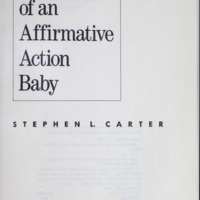-
Title
-
Reflections of an affirmative action baby
-
Description
-
Steven L. Carter's work on racial preference as told from his own personal experience.
-
Identifier
-
416471
-
465068715
-
Creator
-
Carter, Stephen L
-
Source
-
Brian Lamb Booknotes Collection
-
Gift of Brian Lamb, 2011.
-
Catalog record
-
Language
-
eng
-
Date
-
1991
-
Program air date: September 29, 1991.
-
Publisher
-
BasicBooks
-
George Mason University. Libraries. Special Collections & Archives
-
Subject
-
"Affirmative action programs--United States."
-
"African Americans--Employment."
-
"Minorities--Employment--United States."
-
Relation
-
Original Booknotes interview
-
Rights
-
This work may be protected by copyright laws and is provided for educational and research purposes only. Any infringing use may be subject to disciplinary action and/or civil or criminal liability as provided by law. If you believe that you are the rights-holder and object to Mason’s use of this image, please contact speccoll@gmu.edu.
-
Text
-
Transcription of Annotations
Front end papers: 1. Bakke; 2. Gary Franks/N.Y.T.; 3. Pete Starke-Louis Sullivan; 4. C. Thomas-149. Underlinings/notes: 2 part story. Part one life as black professional coming of age in era of affirmative action; 2. Deepening divisions in black community; 3. Black community needs reconciled solidarity based on desire to solve problems. Current students of color have chance at being last of affirmative action generation. Recent years affirmative action started to drift. Current argument people of color have distinctive voice/vision of world. Intellectuals=skeptics. I am a black intellectual. Looking towards end of racial preferences--affirmative action era= mixed blessings. Views sufficiently to left that conservatives wouldn't want him, nor left. Got into law school because black. Baker & McKenzie--nigger/black bitch. Harvard officials--rejected, assumed from record that was white--additional information (race) counted in favor. Proponents of preferential policies insist current generation of white males deserves to bear costs of affirmative action. Many beneficiaries of affirmative action programs don't succeed as they would like.
 416471.pdf
416471.pdf